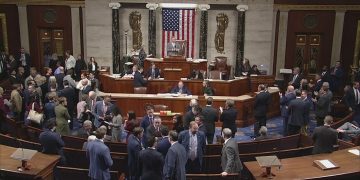In a significant and controversial move, President Donald Trump has signed an executive order to withdraw the United States from the Paris climate agreement for a second time.
This decision comes as Trump begins his second term in office and poses a serious setback to global initiatives aimed at combating climate change, further distancing the U.S. from its international allies.
A Repeat of History
The announcement mirrors Trump’s earlier actions in 2017 when he first declared the U.S. would exit the landmark accord.
The Paris Agreement, established in 2015, aims to limit global warming to well below 2 degrees Celsius (3.6 degrees Fahrenheit) above pre-industrial levels, with an aspirational goal of capping it at 1.5 degrees Celsius.
The agreement allows countries to set their own targets for reducing greenhouse gas emissions from fossil fuel consumption, with a requirement for nations to enhance their commitments over time.
The upcoming February 2025 deadline for new individual plans underscores the urgency of global cooperation in addressing climate change.
Implications of Withdrawal
Trump’s latest withdrawal signals a return to policies that prioritize fossil fuel production over environmental protections.
The outgoing Biden administration had proposed ambitious plans to reduce U.S. greenhouse gas emissions by over 60% by 2035, but this new direction raises concerns about the future of these initiatives.
Experts warn that this withdrawal could isolate the U.S. from emerging clean energy markets and diminish its influence in international climate negotiations.
The U.S., which has historically contributed nearly 22% of global carbon dioxide emissions since 1950, risks losing its leadership role in global efforts to combat climate change.
Global Reactions
While Trump’s first withdrawal from the Paris Agreement drew widespread condemnation, experts noted that no other country followed suit at that time.
Instead, many nations reaffirmed their commitment to reducing emissions, alongside various stakeholders within the U.S., including businesses and local governments.
However, with Trump back in power and dismissing climate change as a priority, there are fears that other countries may use this as an excuse to ease their own commitments to emission reductions.
The Chinese government has already expressed concern regarding the U.S.’s decision, emphasizing its commitment to actively respond to climate change.
The Road Ahead
As Trump embarks on another term with a focus on fossil fuels and deregulation, the potential consequences for global climate efforts are significant.
With climate scientists warning that we are already experiencing record high temperatures and extreme weather events linked to climate change, the urgency for action has never been greater.
The Paris Agreement was designed as a collaborative effort among nearly 200 nations to address one of the most pressing challenges of our time.
Trump’s withdrawal not only undermines these efforts but also sends a troubling message about the United States’ commitment to international cooperation on environmental issues.
As we move forward, it will be crucial for both domestic and international stakeholders to advocate for sustainable policies and practices that prioritize environmental health over short-term economic gains.
The fight against climate change requires collective action, and while Trump’s decision may hinder progress in some areas, it also galvanizes advocates around the world to push for meaningful change in the face of adversity.













